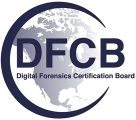What is the DFCB?
The goals and objectives of the DFCB are as follows:
- To promote trust and confidence in the Digital Forensics profession
- To provide an objective certification process in digital forensics which will help the maturation of digital forensics as a science
- To encourage, promote, aid, and affect the voluntary interchange of data, information, experience, and knowledge about methods and processes among the membership of DFCB
- To establish, encourage, and enforce observation of a Code of Ethics and Standards of Professional Conduct
- To publish and distribute books, pamphlets, periodicals, papers and articles supportive of activities and purposes of DFCB
- To establish and conduct such committees, bureaus, and offices as are necessary and incidental to the activities of DFCB
- To conduct surveys, studies, hold conferences, symposiums, seminars, and forums
- To arrange for the presentation of lectures and papers on matters and problems of interest
- To foster, promote, encourage, study, research, facilitate discussion, collect and disseminate information of service or interest to the members of DFCB or the public at large
- To conduct such other related activities as may be necessary, desirable, or incidental to gaining recognition of accomplishments in the field of investigations involving advanced technologies within government, business and academia
The DFCP designation is only available to Digital Evidence Professionals with a minimum of 5-years experience related to digital evidence or digital forensics. The DFCA provides an entry level certification with potential progression to the Digital Forensic Certified Practitioner certification after the candidate accumulates five years of experience. Those seeking the DFCP must demonstrate 2 or more years of practical experience in the last 3 years. Those seeking the DFCA are not required to demonstrate practical experience over the last 3-years.
Rationale and History
The Digital Forensics Certification Board was started in 2004 by the National Institute of Justice Cooperative Agreement (1998-IJ-CX-K003).
The Digital Forensics Certification Board (DFCB) is a non-profit organization of the International Association of Financial Crimes Investigators (IAFCI). The DFCB provides objective certifications in digital forensics which promotes trust and confidence in the Digital Forensics profession. The board provides knowledge-based support from government agencies, the private sector, and academia.
Status as an Officer, Employee, Board Member, or Committee Member of this organization requires that they conduct themselves in a manner that exemplifies the highest standards in ethics and professionalism. The following represents the conduct and behavior required for all Officers, Employees, Board Members, and Committee Members of the DFCB
Officers, Employees, Board Members, and Committee Members shall:
- Use their best efforts to further the best interests of the digital forensics profession
- Treat all information entrusted to the DFCB with the appropriate confidentiality
- Comply with the By-laws of the DFCB
- Carry out their duties in a professional manner, strive to be worthy of the confidence of the public, and refrain from conduct adverse to the best interests and purposes of the DFCB.
- Regard and respect their peers with the same standards that they hold for themselves
Certification represents a level of competency that meets specified criteria set by experts in the field for completing a task to an acceptable standard.
As a profession develops, there comes a point where there is a need for “Competency Cards” from a nonbiased evaluator that will give credence to the veracity of the card holder. Professional certification is that “Competency Card”. The developers of this card are the digital forensic experts in the larger community. The “larger community” is defined as individuals in law enforcement, forensic scientists, business, industry and the legal communities working in this field and representing their organizations or departments.
